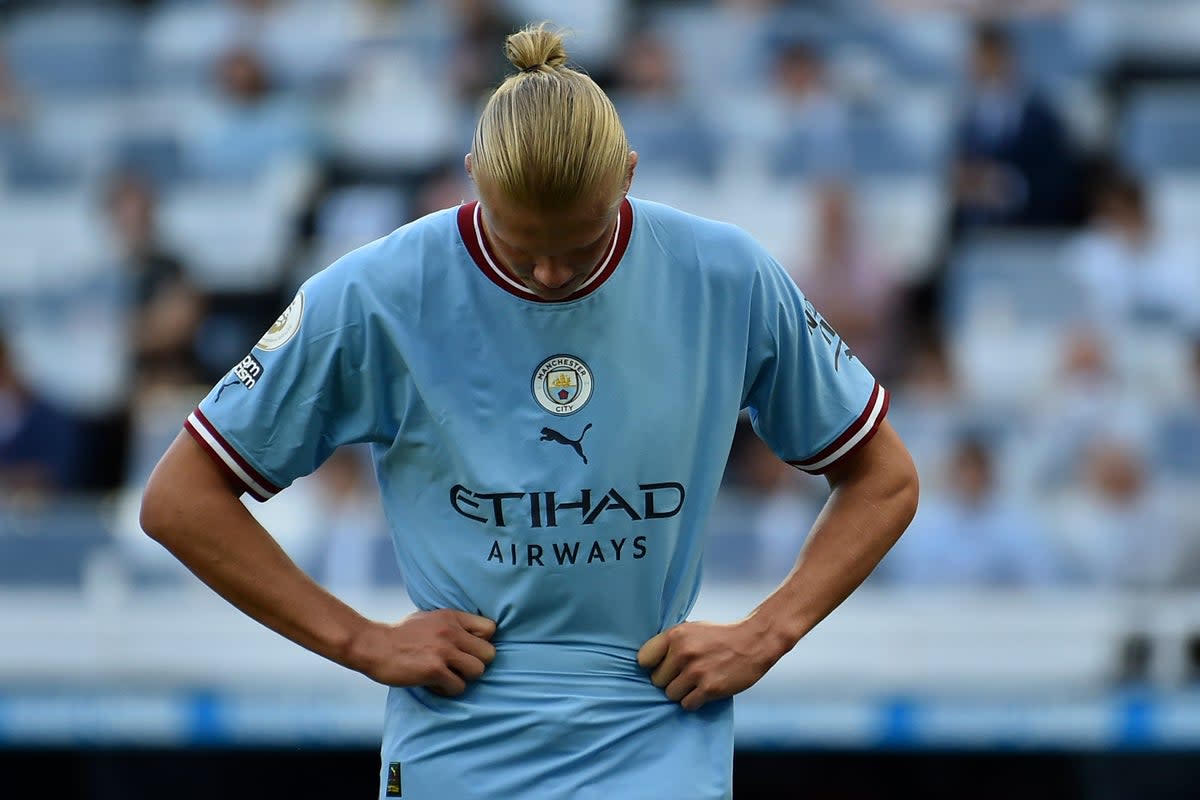Manchester City’s title rivals can take some encouragement from Newcastle draw but not much

At the sound of the final whistle at St James’ Park, you wondered what the pretenders to Manchester City’s throne were thinking.
At Liverpool mainly, as that is where the only credible challenge is expected to come from, but also at Tottenham Hotspur, who are level on points with the champions after three games, and at Arsenal, who will find themselves sitting top of the pile if they take a premature look at the table. You wondered what the reaction might be at Chelsea too, despite them still reeling from defeat at Elland Road.
Thomas Tuchel’s side are only three points behind City, after all. Liverpool will move to within two if they beat Manchester United this evening. Yes, it probably is far too early to be discussing any of this. No gap is going to be insurmountable at this early stage. But after setting a breathless title-winning standard in four of the past five years, where anything less than a win may as well be a defeat, City dropped points.
And more than that, the thrilling 3-3 draw with Newcastle United suggested on the surface level at least that the champions are also vulnerable to what has so far proved to be a slightly less predictable Premier League.
Of the so-called ‘big six’, only Arsenal have a 100 per cent record after three games. Of the other five, only Tottenham have exclusively dropped points to another big six rival. Liverpool and Chelsea have all dropped points to the so-called ‘other fourteen’. United have dropped even more and have played so miserably in the process that they do not warrant a mention in this conversation except for the purposes of completeness.
City have now joined the same club and displayed an unexpected yet familiar vulnerability in the process.
Allan Saint-Maximin caused an untold amount of problems, setting up Newcastle’s first two goals with direct running that forced Guardiola’s defence onto the back foot, then winning the free-kick for the third in similar fashion. Defending counter-attacks was once widely considered City’s kryptonite, until a tactical reshuffle two seasons ago slowed their tempo down in possession and prioritised control above all else. This was a sudden, unexpected flashback to a time when Guardiola’s defence regularly looked penetrable.
Guardiola himself identified this as the issue in his post-match press conference and wanted his players to show more patience in attack. “We should spend more time in the final third, give more possession that moment, but it's difficult because Erling [Haaland's] going, Phil [Foden] has this aggression to go. If Jack [Grealish] or Riyad [Mahrez] or Bernardo [Silva] play right, they are more calm and help us to be calm together.” Attacks broke down too quickly though, exposing City to Newcastle’s counters.
Bernardo himself agreed. “My perception on the pitch was that we started attacking too quick. When we start playing like this and it's too quick it's better for the opponents,” he said. “Overall we played quite well but not controlling their counter-attacks and runners. You'll suffer and that's what happened today.”
This was what scuppered the only failed title defence of the Guardiola era in 2019-20 and briefly threatened to spoil 2020-21 too. Its re-emergence is potentially promising for City’s title rivals.
Or is it? City have overcome this issue already, after all, and as Guardiola suggests, it may be nothing a switch in personnel cannot fix. The much-criticised Grealish - who was absent with a minor muscle injury - is ideal for solving exactly this problem. Sometimes accused of slowing down City’s play, he serves that very purpose, allowing the defence to prepare itself against potential counters, while still bringing the ball into dangerous areas of the pitch.
And then, there’s the level of opposition to consider. While the likes of Liverpool and Chelsea have dropped their points to decent opponents or in testing circumstances, the fixtures in question are unlikely to be considered as difficult as City’s come May.
It is still a little unclear exactly how good post-takeover Newcastle are, given how last season split into distinct halves - from relegation form before New Year’s Day to Champions League form after it. On this evidence, it is more the latter than the former. Guardiola can lavish praise on opponents to the point where it comes across as insincere but his claim that Newcastle are “becoming one of the toughest opponents” was measured and genuine.
“You can see [Eddie Howe’s] team is growing,” he added. “Newcastle have everything; they have pace, they have quality. They made it very physical, it’s a very difficult place to come.”
Perhaps that’s why Guardiola was agitated and frazzled on the touchline at St James’ Park throughout. Then again, he is like that when City are winning too. And even after a brilliant display of counter-attacking by Newcastle, which exposed and exploited a forgotten weakness of City’s, the champions still came back from 3-1 down and were only denied all of the points by an inspired goalkeeping display by Nick Pope.
Post-match, a more relaxed Guardiola dissected his side’s first dropped points of the new season with clarity rather than frustration, knowing where he and his players had gone wrong, knowing why too, and knowing how to fix it. City’s slight slip-up can offer a crumb of comfort to rivals who have slipped a little further at this early stage of the new season but, even then, not much.

